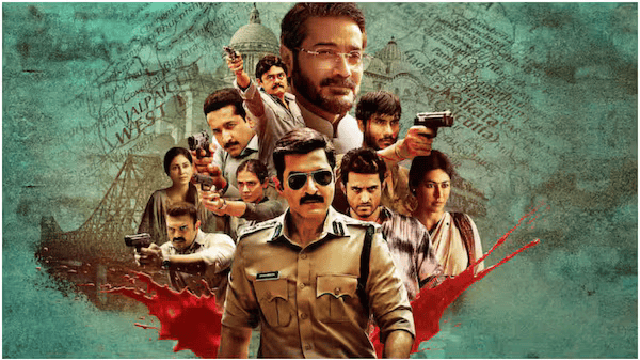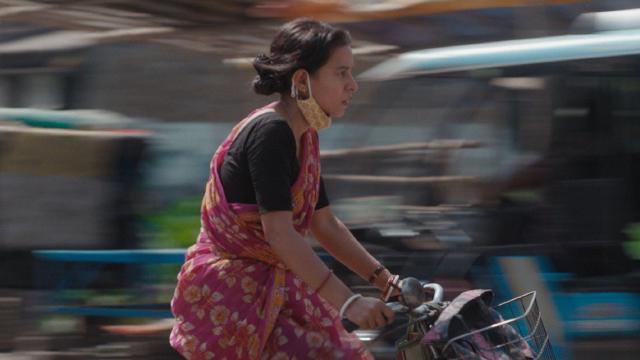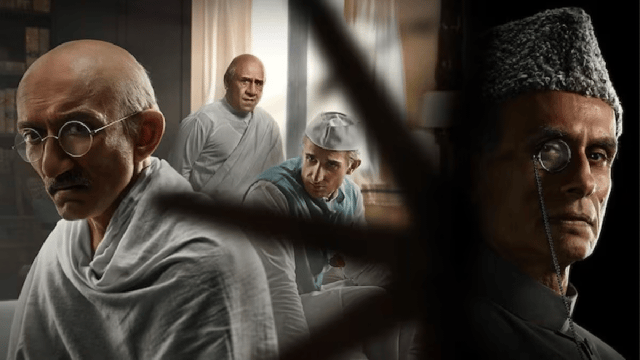
Recent Reviews by Ishita Sengupta
Independent Film Critic

Ishita Sengupta is an independent film critic and culture writer with a keen focus on nonfiction work. Her writing is informed with gender, pop culture and politics and it has appeared in publications like The Indian Express, The Hindu Frontline, OTTplay among others.
Films reviewed on this Page
Tumko Meri Kasam
Khakee: The Bengal Chapter
Nadaaniyan
Baksho Bondi (Shadowbox)
Baby John
All We Imagine as Light
Freedom at Midnight
Singham Again
Jigra
Tumko Meri Kasam

A Sappy Courtroom Drama
Vikram Bhatt's Tumko Meri Kasam is a vanity vehicle. This is not an anomaly but given the rut Hindi cinema is in, the existence of such a film only reinforces the pliability of the industry.
Second time within months there is an Aurangzeb reference in a Hindi film. If the Mughal ruler was vilified in Laxman Utekar’s Chhaava then he is freshly referenced in Vikram Bhatt’s Tumko Meri Kasam. A character wickedly says he can do anything to sit in the seat of power, like Aurangzeb. But neither the man saying it is particularly odious nor is the outcome of the mention a disaster. One can argue about the overall ineffectiveness of Bhatt’s new work, but, in reality, Tumko Meri Kasam harks back to the good old time in Hindi cinema when films were made without agenda and motives, and scenes were allowed to breathe and not spliced together by furtive video-game editing. Well, one part of this is more true than the other. Scenes go on unendingly in Tumko Meri Kasam (endearing at first and grating soon after) as the narrative veers towards propaganda. Except, Bhatt’s film props up a man and not a nation. But given that it props at least something up, Anupam Kher features in a central role and does everything. He stands in court as the accused; he argues as his own lawyer and doubles up as a detective to find loopholes in the case even as police officers remain conspicuously absent like what we are watching is a figment of someone’s imagination.
All 2 reviews of Tumko Meri Kasam here
Khakee: The Bengal Chapter

The Bengal Chapter Is A Toothless Political Thriller
Neeraj Pandey's show undercuts nuances and unfolds as an inflated cat-and-mouse thriller that could have been set anywhere and at any time. The lay of the land has little bearing on the proceedings.
LAST WEEK, a tightly wound, one-shot wonder called Adolescence dropped on Netflix. It took a couple of days and the verdict was out: this is the streamer’s breakout show of the year. Like Baby Reindeer was in the previous year and the first season of Squid Games, the Korean survival thriller, was in 2021. The list keeps expanding as one looks back but the dearth of Indian titles is conspicuous. Vikramaditya Motwane’s Sacred Games (2018) was a formidable start but the mentions have only been leaner with time. There is a distinct kind of non-commital work that is more content in occupying space than inhabiting time. They speak a lot but say too little. Except for Motwane’s Black Warrant (co-directed by Satyanshu Singh), most Netflix originals from India this year have been an assembly line of similar-looking production. Neeraj Pandey’s sprawling Khakee: The Bengal Chapter, the second part of his Khakee franchise, is the newest addition.
All 12 reviews of Khakee: The Bengal Chapter here
Nadaaniyan

Where Are We Headed?
Shauna Gautam’s debut feature Nadaaniyan's leads are so dull that even in a ranking of Hindi cinema’s most forgettable protagonists, Pia (Khushi Kapoor) and Arjun (Ibrahim Ali Khan) wouldn’t qualify.
History is proof that the most memorable Hindi films have centred on impossible deals. I will offer some examples. In Raj Kanwar’s Judaai (1997), a wife sold her husband to another woman for a briefcase of cash. In Satish Kaushik’s Hum Aapke Dil Mein Rehte Hain (1999), the two principal characters enter into a one-year marriage contract; in S. Shankar’s Nayak: The Real Hero (2001), a journalist makes a deal with a chief minister to fill in his shoes for a day. Apart from finding Anil Kapoor, the actor present in all three films, either brokering deals or being brokered in such agreements, the instances highlight the commonality of these segues.
All 19 reviews of Nadaaniyan here
Baksho Bondi (Shadowbox) (written for Berlinale Talent Press)

Shadowbox: A Nebulous Tale of Captivity and Resistance
In a literal world, ‘Baksho Bondi’ — Bengali words carrying set meanings — need not exist together. When translated to English, ‘baksho’ means ‘box’ and ‘bondi’ is ‘captive’; both denoting the idea of being boxed up. But then again, in a literal world the verbatim translation of ‘Baksho Bondi’ would be a phrase: captive in a box. Yet first-time directors Tanushree Das and Saumyananda Sahi forsake precision in favour of interpretation, choosing Shadowbox (Baksho Bondi, 2025), meaning to fight with an imaginary adversary, as the English title, and in doing so, shrink the subjectivity of a person to the objectivity of an experience. The result is a film that unfolds as an interplay of both titles —imbued with the angst of confinement and the spirit of resistance— while mirroring the ambiguity that comes with it. Maya (Tillotama Shome) lives with her husband and son in Barrackpore, a neighbourhood located at the fringes of Kolkata, a densely populated Indian city. She works constantly although the specificity of her labour takes shape later. She irons clothes and ferries them from door to door on a cycle, and does domestic work for a family. In between, she outlines her husband’s routine and instructs their teenage son Debu to help him with it.
All 2 reviews of Baksho Bondi here
Baby John

The Worst Film Of The Year
With Baby John, Varun Dhawan joins the long line of male actors transitioning to action stars who willingly hack and chop. He does the same but with an abject insincerity that gleams from the screen.
Like all bad films, Kalees’ Baby John gets worse by the second. But like a special kind of bad film, the progression happens in leaps and bounds. If the first fifteen minutes are infuriating, half an hour later the film makes you question your life’s choices. By the time the first half closes, you are having an existential meltdown and as the end credits roll, your orientation to reality has altered. Was that real? Was he real? Is any of this real or are we stuck in a parallel universe of Atlee’s imagination where everything on screen unravels as a duller version of his stylistic choices?
All 13 reviews of Baby John here
All We Imagine as Light (written for OTT Play)

A Moving Ode To Mumbai & Sisterhood
Payal Kapadia's All We Imagine as Light is one of those life-altering gems that is transcendental and a moving memoir of mundane, transformative and a crushing reiteration of community sustenance.
Three women, monsoon and a severe city. If Payal Kapadia’s iridescent All We Imagine as Light was a novel, there would be dried flowers stuck between its pages. Since it is a film, the intangible feeling is imbued with visual tactility. It is present in the way Prabha (Kani Kusruti), a middle-aged woman, holds a totem of cold technology within the warmth of her embrace. It is embossed on the face of Parvaty (Chhaya Kadam), a woman in the middle of a crisis, as she listens to a fiery political speech about reclaiming what is hers. And it drips from the text messages a young Anu (Divya Prabha) sends to her lover: “I am sending you kisses through the clouds so that when it rains my kisses touch your lips.” Kapadia’s film is suffused with such ache that if you extend your hand you can touch it.
All 7 reviews of All We Imagine as Light here
Freedom at Midnight (written for OTT Play)

Nikhil Advani’s Pre-Independence Drama Is Immensely Watchable
Freedom at Midnight is about the historicity of 1947 conveyed through the lives of those who curated the history.
With Freedom at Midnight, Nikhil Advani continues looking at big cultural moments through the microscopic gaze of an insider. Across the two seasons of his breakout show Mumbai Diaries, the filmmaker portrayed pressing social crises through the labour of medical practitioners attending to the casualties. This shift in slant sidestepped the showiness prone to cinematic excess and allowed for a more intimate rendering of public events, transforming, therefore, the narrative around them. In his latest long-form work, Advani turns his gaze to the wide spectrum of India’s independence and reiterates his style of focusing on the bureaucratic bottleneck, telling the story therefore of the people living inside towering buildings and not on the street. Freedom at Midnight is about the historicity of 1947 conveyed through the lives of those who curated the history.
All 11 reviews of Freedom at Midnight here
Singham Again

A Modern-Day, Cop-Addled Reimagination Of The Ramayana
Of all the improbable things in Rohit Shetty’s Singham Again, like a car flying over a helicopter, like the same car landing without a scratch, like gifted actors dialling down their craft to match the trite script, like six people writing that script, like Ajay Devgn mistaking walking for acting, like the film mistaking walking for acting, the one that sticks out the most is Shetty assembling half the Hindi film industry (an exaggeration but you get the drift) to combat Arjun Kapoor.
All 17 reviews of Singham Again here
Jigra

Alia Bhatt In & As The Angry Young Woman
In Vasan Bala’s Jigra (Courage) Alia Bhatt is Amitabh Bachchan. The suggestion seems both foolish and foolhardy, not least because both actors have disparate, almost contrasting, physicalities. They act differently, they react differently. And more crucially, a punch lands on them differently. If Bachchan in his youth stumbled upon being hit, then Bhatt crumples like a paper bag. If the former’s daunting presence intimidates the frame then the latter’s diminutive silhouette makes space for others. Alia Bhatt is nothing like Amitabh Bachchan yet Bala insists that she is, for she has the jigra.